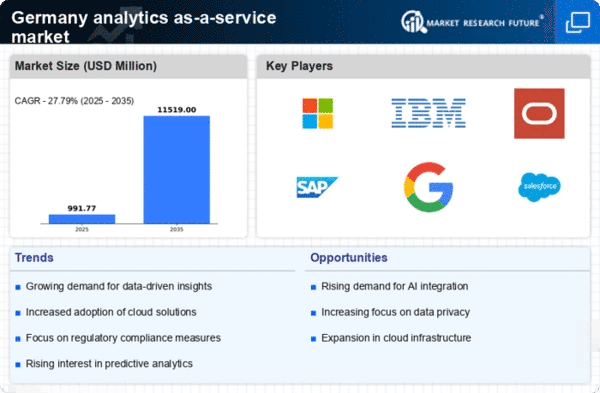Increased Focus on Cost Efficiency
Cost efficiency is becoming a critical driver for the analytics as-a-service market in Germany. Organizations are seeking ways to optimize their operational expenditures while still gaining access to advanced analytics capabilities. The subscription-based model of analytics as-a-service allows businesses to reduce upfront costs associated with traditional analytics solutions, making it an attractive option. Recent surveys indicate that nearly 65% of German firms are shifting towards cloud-based analytics services to achieve better cost management. This trend is likely to continue as companies recognize the financial benefits of outsourcing analytics functions, thereby driving growth in the analytics as-a-service market.
Growing Demand for Real-Time Analytics
The market in Germany is experiencing a notable surge in demand for real-time analytics solutions. Businesses are increasingly recognizing the value of immediate insights derived from data, which can enhance decision-making processes. According to recent studies, approximately 60% of organizations in Germany are prioritizing real-time data analysis to improve operational efficiency. This trend is driven by the need for agility in a competitive landscape, where timely information can lead to better customer engagement and optimized resource allocation. As a result, service providers in the analytics as-a-service market are focusing on developing platforms that facilitate real-time data processing and visualization, thereby catering to this growing demand.
Enhanced Collaboration and Data Sharing
The market in Germany is witnessing a growing trend towards enhanced collaboration and data sharing among organizations. As businesses increasingly recognize the value of collective insights, they are seeking analytics solutions that facilitate seamless data exchange. This collaborative approach is particularly evident in sectors such as healthcare and finance, where data sharing can lead to improved outcomes. Approximately 55% of organizations in Germany are investing in analytics platforms that support collaborative features, indicating a shift towards integrated analytics solutions. This driver is fostering a more interconnected analytics ecosystem, ultimately benefiting the analytics as-a-service market.
Rising Importance of Data-Driven Decision Making
In Germany, the analytics as-a-service market is significantly influenced by the increasing emphasis on data-driven decision making across various sectors. Organizations are leveraging analytics to gain insights that inform strategic initiatives, thereby enhancing their competitive edge. Reports indicate that around 70% of German companies are investing in analytics solutions to harness the power of their data. This shift towards data-centric strategies is prompting businesses to adopt analytics as-a-service offerings, which provide scalable and flexible solutions without the need for extensive in-house infrastructure. Consequently, this driver is fostering innovation and encouraging the development of tailored analytics services that meet the specific needs of diverse industries.
Expansion of Internet of Things (IoT) Applications
The proliferation of Internet of Things (IoT) devices in Germany is creating new opportunities for the analytics as-a-service market. As more devices become interconnected, the volume of data generated is increasing exponentially, necessitating advanced analytics solutions to derive meaningful insights. It is estimated that by 2025, the number of IoT devices in Germany could reach over 50 million, leading to a substantial demand for analytics services that can process and analyze this data effectively. This trend is prompting service providers to enhance their offerings, integrating IoT capabilities with analytics as-a-service solutions to help businesses capitalize on the insights derived from their IoT ecosystems.
















